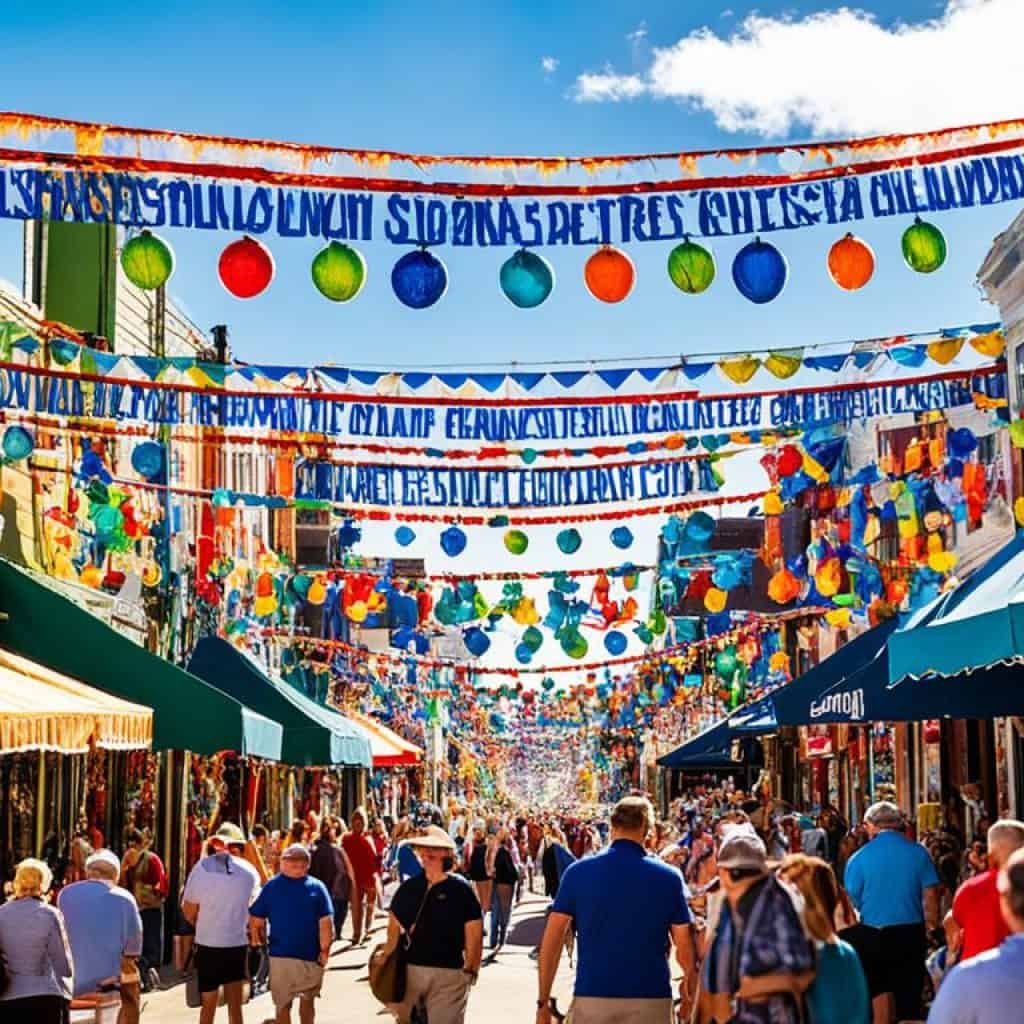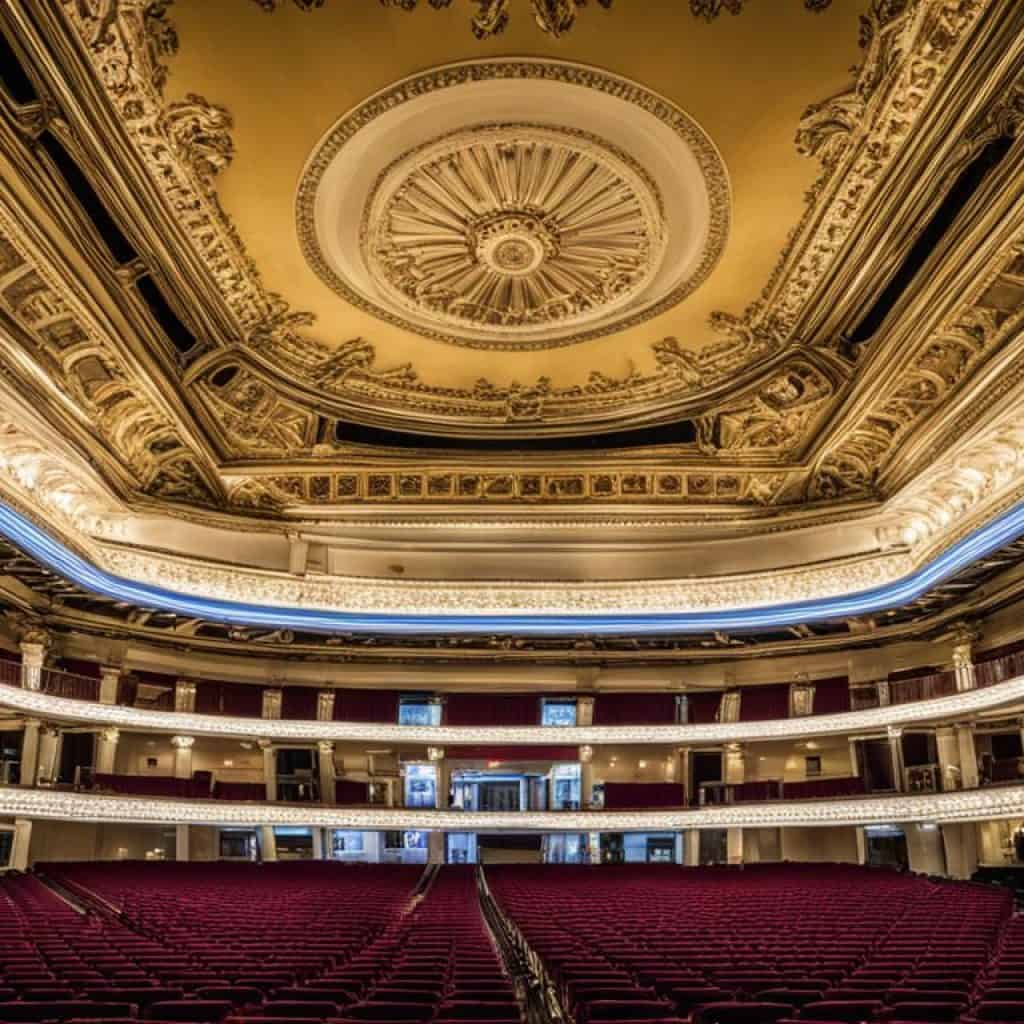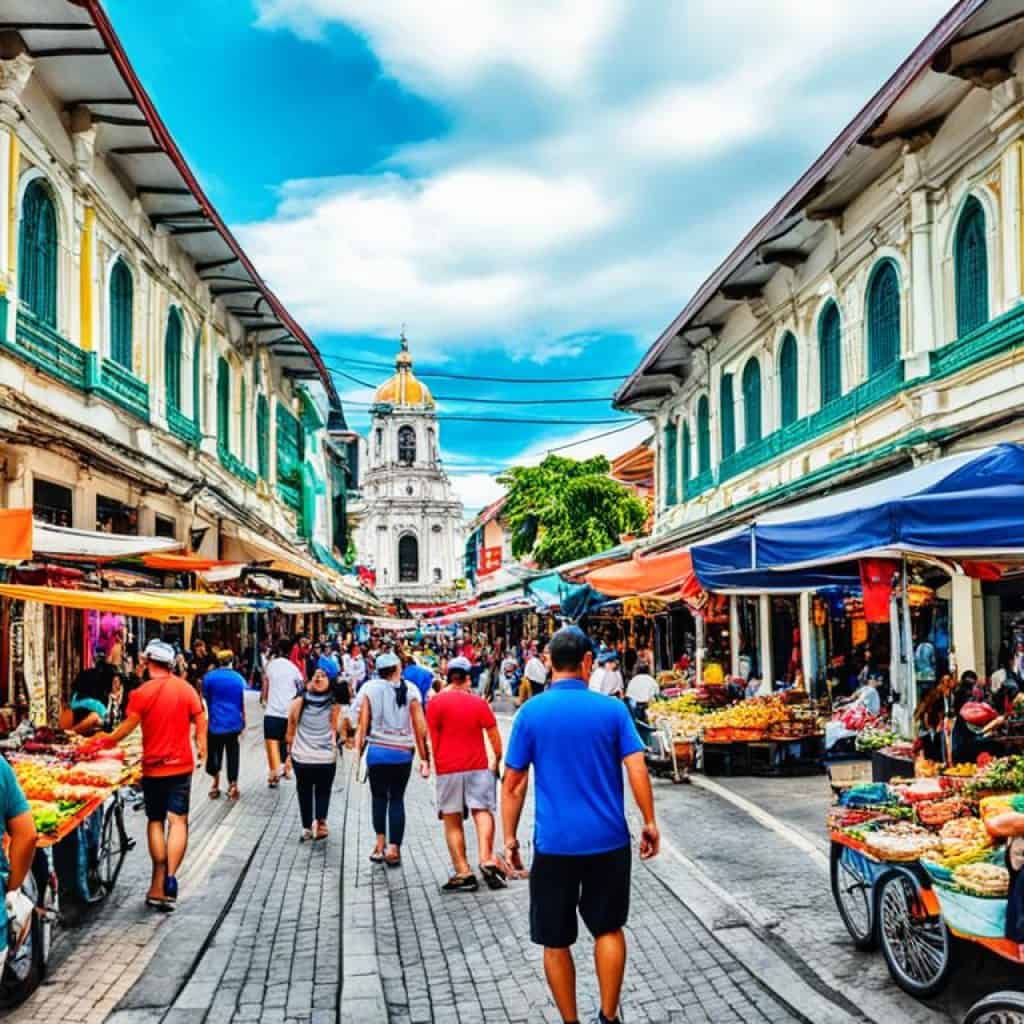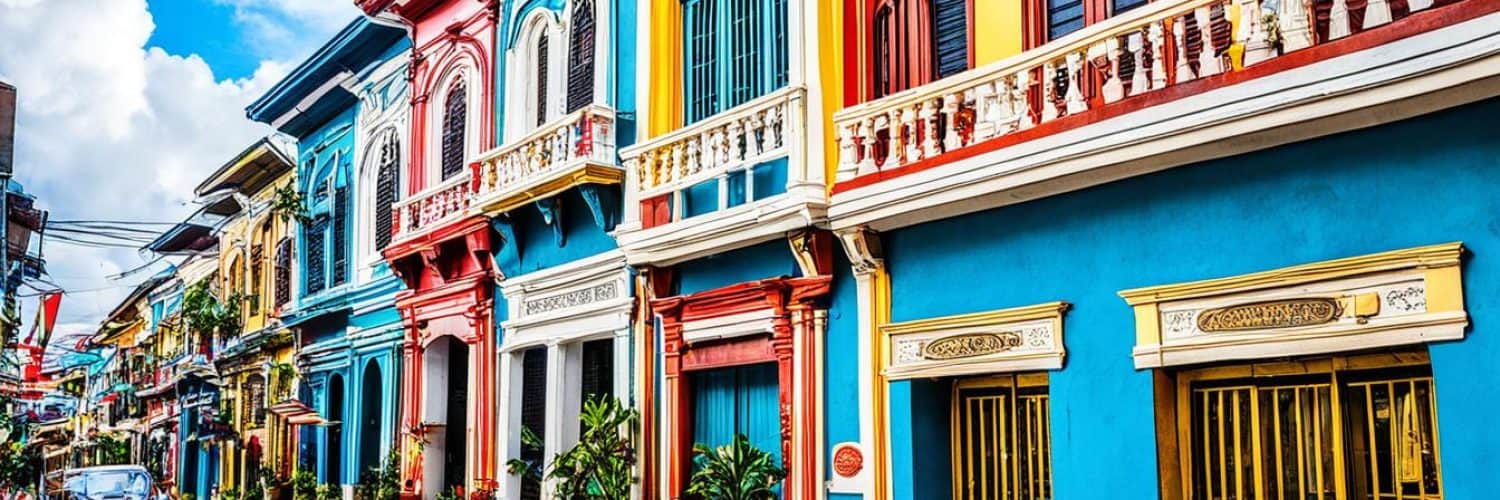Have you ever wondered which street in the Philippines holds the title of being the oldest? Dig deep into the country’s history and uncover the secrets of a remarkable street that has withstood the test of time. Prepare to be amazed as we take you on a journey through the colonial era roads and heritage sites that make up the cultural fabric of the Philippines. Get ready to explore the rich history, architectural wonders, and captivating stories that lie within the oldest street in the Philippines.
Key Takeaways:
- Colon Street in Cebu City is recognized as the oldest street in the Philippines.
- Built during the Spanish colonial period, Colon Street showcases Spanish colonial architecture.
- The street is a national historical landmark and a significant part of the cultural heritage of the Philippines.
- Colon Street attracts tourists who appreciate its rich history and unique charm.
- Exploring Colon Street offers a glimpse into the enduring heritage and cultural significance of the country.
The History of Colon Street
Colon Street, located in Cebu City, has a rich history that dates back to the Spanish colonial period. It was developed by Miguel Lopez de Legazpi and quickly emerged as the commercial center of Cebu. This bustling street was home to the first business establishments in the city, ranging from movie houses to fashion shops and offices.
Surrounded by prestigious universities such as the University of San Carlos, University of Cebu, and University of San Jose-Recoletos, Colon Street holds immense historical significance in addition to being a bustling commercial hub.
The Influence of Miguel Lopez de Legazpi
“Miguel Lopez de Legazpi played a pivotal role in developing Colon Street during the Spanish colonial period. His vision transformed the street into a vibrant commercial center, shaping the growth of Cebu City.”
From Colonial Center to Educational Hub
Over the years, Colon Street has evolved into a prominent educational hub with the presence of renowned universities. The University of San Carlos, University of Cebu, and University of San Jose-Recoletos have all become integral parts of Colon Street’s historical tapestry.
Celebrating Diversity and Heritage
Colon Street stands as a testament to the multicultural heritage of Cebu City. Its Spanish colonial roots, combined with the vibrant atmosphere of the modern-day commercial center, create a unique fusion of the old and the new. This dynamic blend continues to attract both locals and visitors from around the world.
Historical Highlights
| Year | Milestone |
|---|---|
| 1565 | Colon Street developed by Miguel Lopez de Legazpi. |
| 19th century | Colon Street becomes the center of commercialization in Cebu City. |
| 20th century | Universities like University of San Carlos, University of Cebu, and University of San Jose-Recoletos establish their presence on Colon Street. |
The Charm of Colon Street
Colon Street, the oldest street in the Philippines, has remained a charming shopping hub over the years. Visitors are drawn to this historic destination for its unique shopping experiences and the opportunity for bargain shopping. Along the bustling street, numerous shops offer quality goods at affordable prices, making it a haven for savvy shoppers looking for value for their money.
Shoppers exploring Colon Street will find a wide range of products to choose from. From exquisite jewelry to trendy ready-to-wear clothes, the street caters to various preferences and styles. Whether you’re searching for the perfect accessory or updating your wardrobe, Colon Street has it all.
“Colon Street is a hidden gem for those seeking quality goods at bargain prices. I was amazed by the range of options available and how affordable everything was. It’s a shopper’s paradise!” – Emily, a satisfied visitor
The charm of Colon Street lies not only in its affordability and variety but also in its vibrant atmosphere. The street is alive with activity, filled with locals and tourists alike, creating a bustling ambiance that adds to the unique shopping experience.
Experience the joy of finding hidden treasures and take advantage of the affordable prices at Colon Street. Don’t miss out on exploring this shopping gem and discovering the charm that has stood the test of time.
| Jewelry | Ready-to-Wear Clothes |
|---|---|
| Exquisite pieces crafted by local artisans | Trendy and fashionable attire for all ages |
| Wide selection of earrings, necklaces, bracelets, and more | Various styles and sizes to suit different preferences |
| Affordable prices for genuine and sparkling accessories | Quality fabrics and impeccable craftsmanship |
Exploring Colon Street
Getting to Colon Street is a breeze, thanks to the numerous jeepneys that pass through it, providing convenient transportation options. Once you arrive, prepare to embark on a journey of exploration and discovery along this historic street. Colon Street is home to various historical landmarks that offer glimpses into the rich past of the Philippines. Immerse yourself in the vibrant atmosphere of this bustling hub and witness the interplay between old and new buildings, showcasing the area’s rich history and cultural heritage.
Your exploration of Colon Street will lead you to discover the presence of banking institutions that have proudly stood the test of time. These institutions serve as reminders of the street’s significance as a commercial center throughout history. From architectural marvels to treasured establishments, Colon Street truly offers a captivating journey through time.
“Colon Street is a living testament to the legacy of the Philippines. Exploring this vibrant street allows visitors to witness the intersection between history and modernity.” – Local historian
Must-Visit Historical Landmarks on Colon Street
| Landmark | Description |
|---|---|
| Vision Theater | A historic theater featuring unique architecture and an iconic sculpture by Italian artist Dante Guidetti. The Vision Theater reflects the cultural and artistic influences of its time. |
| King Theater | One of the famous movie theaters that once graced Colon Street, showcasing the vibrant entertainment scene of the past. |
| Star Theater | Another beloved movie theater that played a significant role in shaping the entertainment industry on Colon Street and beyond. |
| Seven Arts | A historic theater that entertained generations of moviegoers, contributing to the cultural fabric of the area. |
| Victor Theater | A cherished movie theater known for its unique architectural design and memorable film screenings. |
| Teatro Junquera (Oriente Cinema) | The oldest theater in Cebu, now transformed into Oriente Cinema, serves as a testament to the enduring history of theater and film on Colon Street. |
Best Time to Visit Colon Street
Colon Street can be visited throughout the year, but to avoid large crowds, it is best to visit on weekdays during office hours. This allows visitors to enjoy the shops and attractions without competing with tourist crowds. It is recommended to plan the visit accordingly to make the most of the experience.

When planning a trip to Colon Street, it’s important to consider the best time to visit to ensure a memorable experience. While this historical street in Cebu City attracts tourists year-round, there are certain times when it’s less crowded and more enjoyable to explore.
The tourist season in Cebu typically peaks during holidays and vacations, resulting in larger crowds and longer queues. To avoid the hustle and bustle, it’s advisable to plan your visit during weekdays. On weekdays, especially during office hours, the street is relatively quieter, allowing you to leisurely explore the shops and attractions at your own pace.
By visiting Colon Street on weekdays, you can also take advantage of the ample parking spaces available, as weekends tend to get busy. Whether you’re interested in bargain shopping, immersing yourself in the rich history, or simply strolling through the iconic street, weekdays offer a more relaxed and enjoyable experience.
Additionally, visiting Colon Street during office hours allows you to witness the vibrant atmosphere of the local businesses, as well as interact with the friendly locals who work in the area. You can explore the various shops, boutiques, and dining establishments without feeling rushed or overwhelmed by tourist crowds.
Colon Street is a hidden gem within Cebu City, and by visiting on weekdays during office hours, you can have a more immersive and intimate experience. Take the time to soak in the rich history, appreciate the Spanish colonial architecture, and discover unique finds along this iconic street.
Attractions Near Colon Street
Near Colon Street, visitors have the opportunity to explore a variety of attractions that enhance their experience. One notable destination is Gaisano Metro Colon, one of the largest department stores in the vicinity. This renowned shopping hub offers an extensive range of products at affordable prices, catering to the diverse needs and preferences of shoppers.
In addition to Gaisano Metro Colon, the area surrounding Colon Street is dotted with other shopping malls, each offering a unique shopping experience. These malls provide a plethora of options for visitors to indulge in retail therapy, browse through trendy fashion outlets, and discover the latest electronic gadgets.
To satisfy hunger pangs and recharge during a day of exploration, visitors will find a food court within easy reach. The food court offers a diverse selection of Filipino dishes and desserts, pleasing both locals and tourists alike with their flavors and culinary specialties. It’s the perfect place to take a break, savor delicious meals, and soak in the vibrant atmosphere of the surrounding area.
Exploring the Extravaganza of Shopping Malls in the vicinity of Colon Street
“The department stores near Colon Street showcase an abundance of shopping options, making it a dream destination for enthusiastic shopaholics like myself.” – Sarah Johnson, avid traveler.
Whether you’re searching for fashion, electronics, or simply seeking a dose of retail therapy, the variety of department stores and shopping malls in close proximity to Colon Street guarantees an exciting and fulfilling shopping experience.
| Attraction | Description |
|---|---|
| Gaisano Metro Colon | One of the largest department stores in the area, offering a wide range of products at affordable prices. |
| Other Shopping Malls | A plethora of malls with diverse options to cater to all shopping needs, including trendy fashion outlets and the latest electronics. |
| Food Court | A diverse selection of Filipino dishes and desserts, providing visitors with a delightful culinary experience. |
Historic Structures on Colon Street
Colon Street, the oldest street in the Philippines, is not only a testament to the country’s rich history but also home to several iconic historic structures. One such structure is the renowned Vision Theater, a true architectural gem. This magnificent building showcases unique architecture, with its facade adorned by a sculpture crafted by Italian artist Dante Guidetti.
Colon Street also boasts a vibrant history of movie theaters, further enhancing its cultural significance. Movie enthusiasts will appreciate the presence of famous venues such as the King Theater, Star Theater, Seven Arts, and Victor Theater. Each of these theaters holds a special place in the hearts of locals and visitors alike, symbolizing the entertainment legacy of Colon Street.
An enduring symbol of the past, Teatro Junquera, now known as Oriente Cinema, stands as the oldest theater in Cebu. With its historical charm, it captivates those who pass by, evoking nostalgia for a bygone era. Teatro Junquera is a prime example of the architectural grandeur that can be found on Colon Street.
These historic buildings on Colon Street serve as tangible reminders of the city’s cultural heritage and its connection to the past. Exploring these remarkable structures offers a unique opportunity to immerse oneself in the rich history that defines this venerable street.

The Vision Theater: A Glimpse into the Past
“The Vision Theater stands as a testament to the architectural brilliance of its time and continues to captivate visitors with its unique design.” – Architectural Review
Colon Street’s Popularity
Colon Street in Cebu is renowned for being one of the most crowded areas in the city, especially during the Christmas season and the Sinulog Festival. These festive periods attract a large number of visitors seeking to immerse themselves in the lively atmosphere and experience the vibrant energy that fills the street.
However, it’s essential to remain cautious and take necessary precautions, particularly in crowded settings, as pickpocketing incidents may occur. Despite the high volume of people, Colon Street is still a safe place to explore and visit. The presence of traffic enforcers and security guards ensures the well-being and security of both locals and tourists alike.
Visitors to Colon Street during the Christmas season and Sinulog Festival can expect a bustling and dynamic environment, brimming with festive cheer and an array of activities. It is a wonderful opportunity to witness the vibrant culture and joyous celebrations that define Cebu’s holiday seasons.
Colon Street as a Cultural Landmark
Colon Street, with its rich history and enduring heritage, holds significant cultural significance as a historical landmark in the Philippines. This iconic street, built during the Spanish colonial period, serves as a reminder of the country’s colonial past and showcases the profound Spanish colonial influence on its architecture and design.
The cultural heritage of Colon Street is visible through its distinct Spanish colonial architecture, which captivates visitors and transports them back in time. The elegant facades of the buildings and the intricate details speak volumes about the country’s historical roots and the enduring legacy of its colonial past.
Exploring Colon Street allows visitors to immerse themselves in the cultural tapestry of the Philippines, offering a glimpse into its vibrant history and the influence of Spanish colonization. The street’s historical structures, such as the Vision Theater, stand as testaments to its enduring heritage.

“Colon Street is a treasure trove of cultural significance, embracing the Spanish colonial heritage of the Philippines. Walking along its storied path, one can feel the echoes of history, connecting with the enduring legacy of this remarkable street.” – Maria Cruz, Cultural Historian
Colon Street’s cultural significance extends beyond its architectural marvels. It serves as an emblem of national pride, preserving the heritage and identity of the Filipino people. Visitors who explore Colon Street gain a deeper understanding of the country’s cultural fabric and the influences that have shaped its unique identity.
Spanish Colonial Influence: A Timeless Reminder
The Spanish colonial influence evident throughout Colon Street is a testament to the lasting impact of that era. The fusion of Spanish and local elements in the street’s design reflects the historical and cultural intersection that defined the Philippines during the colonial period.
With its enduring heritage and cultural significance, Colon Street invites visitors to embark on a journey through time, unraveling the layers of history and appreciating the diverse cultural tapestry of the Philippines. It stands as a living testament to the country’s rich past and serves as a cultural landmark worth exploring and cherishing.
Personal Experiences on Colon Street
Visitors who have explored Colon Street rave about their unique shopping experiences and cultural immersion. This bustling street offers a refreshing change from the typical mall shopping, with its affordable prices and vibrant atmosphere. It provides an opportunity to interact with the local community and truly immerse oneself in the rich history and heritage of the area.
“Exploring Colon Street was an absolute delight! The hustle and bustle of the street, coupled with the unique shops and stalls, made it a shopping experience like no other. I felt like I was stepping back in time as I walked along the historic pavement, discovering hidden gems at every turn.”
~ Amanda, Travel Enthusiast
Colon Street’s distinct charm lies in its ability to transport visitors to a bygone era while presenting a vibrant mix of old and new. The shops along the street offer a variety of products, from handmade jewelry to ready-to-wear clothes, ensuring that every visitor finds something special to take home.
During my time on Colon Street, I couldn’t help but be captivated by the rich cultural tapestry woven into the fabric of the area. The street serves as a meeting point for locals and tourists, allowing for meaningful interactions and cultural exchanges. It’s a place where visitors can truly immerse themselves in the traditions, customs, and way of life of the local community.
For those seeking more than just a typical shopping experience, Colon Street delivers an authentic and immersive journey into the heart of Philippine culture and heritage.
Recommendations for Visiting Colon Street
When planning a visit to Cebu, make sure to schedule some time for shopping at Colon Street. As the oldest street in the Philippines and a historical landmark, it offers a unique shopping experience that combines rich history with a vibrant atmosphere.
For those in need of accommodation, websites like Hotels Combined provide customer reviews and allow for easy comparison of Cebu hotel rates. This ensures a comfortable stay during your visit while catering to your specific preferences and budget.
Exploring Colon Street is a must for anyone interested in experiencing the cultural heritage of the Philippines and discovering hidden gems along the historic street. Don’t miss out on the opportunity to immerse yourself in the unique shopping atmosphere and vibrant history that Colon Street offers.
Tips for Enjoying Your Visit:
- Schedule dedicated time for shopping at Colon Street to fully explore the shops and find unique products.
- Check customer reviews and compare hotel rates on websites like Hotels Combined for a comfortable and enjoyable stay in Cebu.
- Engage with the friendly locals and shopkeepers to get recommendations for the best bargains and hidden shopping spots.
- Immerse yourself in the vibrant atmosphere of Colon Street, appreciating the mix of old and new buildings along its historical stretch.
Visiting Colon Street is not just about shopping; it’s a chance to step back in time and experience the rich cultural heritage of the Philippines.
Preservation of Colon Street
The preservation of Colon Street is vital in order to safeguard its historical value and cultural heritage. Efforts must be made to conserve its unique architecture and sustain its historical significance amidst ongoing urban development. Recognizing the importance of this cultural site is crucial for its continued preservation and enjoyment by future generations.
Colon Street serves as a tangible link to the past, representing the rich history of the Philippines and the enduring legacy of Spanish colonial influence. As urban development progresses, it becomes increasingly important to balance the need for growth with the preservation of historical landmarks.
“The heritage of Colon Street is a testament to our collective history and identity. It is our responsibility to protect and value these cultural treasures, allowing them to serve as a source of inspiration and pride for future generations.”
To accomplish this, active measures should be taken to conserve the unique architectural features of Colon Street, such as its colonial-era buildings and traditional structures. These efforts can include restoration projects, maintenance programs, and strict regulations regarding any alterations or demolitions within the area.
Moreover, it is essential to involve local communities, heritage conservation organizations, and urban planners in the preservation process. Collaboration and active participation from all stakeholders can lead to effective strategies for safeguarding Colon Street’s historical and cultural significance.
Maintaining a balance between heritage conservation and urban development
As urban development continues to shape the landscape of cities, it is crucial to find a harmonious balance between progress and heritage conservation. By integrating historic preservation into urban development plans, cities can retain their cultural identity while embracing growth and modernization.
One approach is to incorporate adaptive reuse strategies, repurposing historic buildings for contemporary uses that align with the street’s heritage. This not only preserves the architectural integrity but also contributes to the economic revitalization of the area.
Preserving Colon Street can also be enhanced through the implementation of zoning and building regulations that respect and protect the area’s historical character. By carefully selecting compatible architectural styles and materials for new constructions within the vicinity, the unique ambiance of the street can be maintained.
Public awareness and education about the historical value of Colon Street are essential as well. By fostering appreciation and understanding of its cultural significance, the local community can actively participate in its preservation and support initiatives to protect this cherished heritage site.
Conclusion
The preservation and recognition of Colon Street in Cebu City are crucial for preserving the rich heritage and cultural importance of the Philippines. As the oldest street in the country, it holds immense historical significance and serves as a living testament to the Spanish colonial era and its influence on Filipino architecture and culture.
Colon Street not only showcases stunning Spanish colonial architecture but also offers a unique shopping experience and vibrant atmosphere. It is a place where visitors can immerse themselves in the rich history and interact with the local community.
Preserving this historical landmark is essential to honor the country’s past and ensure that the cultural importance of Colon Street is recognized by future generations. By conserving its unique architecture and sustaining its historical significance, we can continue to appreciate and celebrate the heritage of this iconic street.


















Add comment